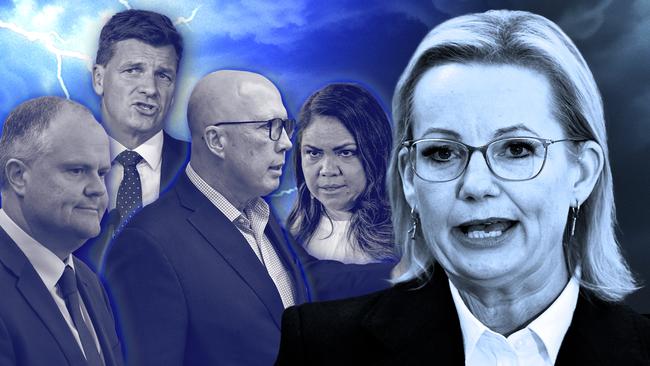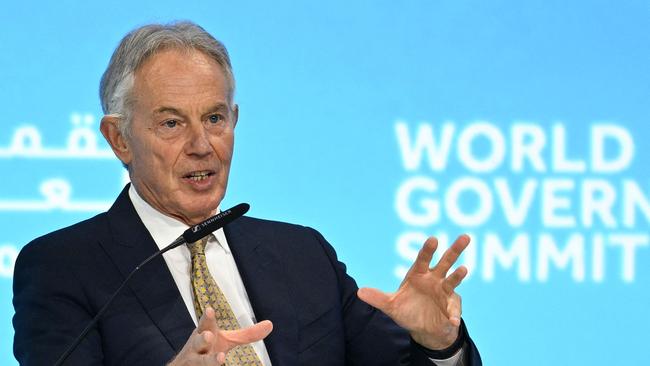
Five years ago, Sussan Ley rejected a wind turbine development in Queensland’s Connors Range, ruling the damage caused would be “clearly unacceptable”.
In December 2022, Tanya Plibersek reversed the decision. The Palaszczuk Queensland government acquired the Lotus Creek development, and construction proceeded. Ley is one of the few state or federal ministers who dared to reject a wind turbine development on environmental grounds. She found an unexpected ally in Christine Milne, the former leader of the Greens. “Did anyone in Plibersek’s office point out the significance of Connor’s Range area as a core habitat for koalas and gliders?” Milne wrote on social media in March. “Work on this project must stop.”
But the tide is turning. Target mania is giving way to pragmatism. A fortnight ago, David Crisafulli’s LNP government blocked the Moonlight Range turbine development 45km west of Rockhampton. It says it will review Queensland’s wildly ambitious 2030 and 2035 emissions targets, which are driving the headlong rush to industrialise vast areas of farmland and native vegetation.
The federal parliamentary Liberal Party has the opportunity to follow suit under its new leader, who has announced it will review all policies implemented since the last election.
That must include the unworkable and uncosted commitment to net-zero greenhouse gas emissions by 2050. The party must return to what it does best: rational, evidence-based policymaking that recognises there must be trade-offs.
Sentiment won’t be enough. Those in the partyroom who wish to retain the net-zero target must add substance to their arguments. They must justify the multitrillion-dollar cost and map out a credible pathway, explaining how they plan to close the technology gap. They must justify the investment in land and capital, as these are scarce resources that could be used for other purposes.
The Liberal Party’s net-zero policy is electorally ineffective and technically unachievable. The strategy of adopting the net-zero mantra to make the Liberal Party more politically attractive has comprehensively failed. The privileged voters whose luxury opinions it was supposed to satisfy voted for the teals in 2022 and were reluctant to return three years later.
Meanwhile, the world has moved on, driven by the energy shock of Russia’s invasion of Ukraine, Donald Trump’s return to the US presidency, and the growing demand for energy to support artificial intelligence, among other factors. Fears that Australia would face economic sanctions if it stepped outside the straitjacket imposed by the Intergovernmental Panel on Climate Change have receded.
Labor’s climate policy is based on discredited modelling and unworldly assumptions about the speed of the “energy transition”. The pace of investment in so-called renewable energy has fallen significantly short of the level required to meet the government’s 2030 targets. The government is technically in breach of the Paris Agreement for failing to meet the March deadline to announce targets for 2035. A 2035 target will remain meaningless without a credible path to meeting its legislated commitment to a 43 per cent reduction on 2005 levels by the end of this decade.
The Liberal Party must seize the opportunity to declare that the emperor is naked. It should distance itself from the unspoken fantasy to which it has subscribed for much of this century: that the chief obstacle to abandoning hydrocarbons is a lack of political will.
Adopting a rational energy policy bounded by economic and engineering constraints would hardly put the Liberal Party at a disadvantage. Former UK prime minister Tony Blair was an enthusiastic adopter of the climate change narrative in the late 1990s.

In a keynote 2004 speech, he described it as “a challenge so far-reaching in its impact and irreversible in its destructive power that it alters radically human existence”.
While Blair has not reneged from that position, he decries the unfulfilled promise of the 2015 Paris Agreement, which has distorted the debate “into a quest for a climate platform that is unrealistic and therefore unworkable”.
“Too often, political leaders fear saying what many know to be true: the current approach isn’t working,” he wrote in the foreword to a report by Lindsay Fursman published in April by the Tony Blair Institute for Global Change.
Blair’s supporting arguments for his assertion are hard to contest. The surge in renewable energy investment has not halted the rise in fossil fuel production, nor will it stop it increasing in the future. In 2024, China began building 95 gigawatts of new coal-fired power plants, and India recently announced it had reached the milestone of one billion tonnes of coal production in a single year.
Airline travel is set to double over the next 20 years. By 2050, urbanisation is expected to drive a 40 per cent increase in demand for steel and a 50 per cent increase in demand for cement.
By 2030, almost two-thirds of global emissions will come from China, India and Southeast Asia.
“These are the inconvenient facts, which mean that any strategy based on either ‘phasing out’ fossil fuels in the short term or limiting consumption is a strategy doomed to fail,” Blair wrote.
He calls for policy pragmatism rather than aspiration, arguing that nuclear will be an essential part of the answer. “The irrational fear of it, intensified by hyperbolic campaigning, has led the world to an egregious policy error,” he wrote. “Embracing it would have significantly changed the trajectory of global emissions.”
Blair says many world leaders would like to take the hysteria out of the climate debate, but “they’re terrified of saying so, for fear of being accused of being ‘climate deniers’ ”.
The debate is moving fast. The UK’s Conservative Party leader Kemi Badenoch is dropping her party’s commitment to reaching net zero by 2050, arguing that it is eroding public trust.

“The only way that we can regain it is to tell the unvarnished truth – net zero by 2050 is impossible,” she said in March.
As Ley seeks to assert her authority within her shattered party, the swift abandonment of net zero would end any suggestion she is beholden to the NSW party moderates and distance her from their unelected factional leader, Michael Photios, and his commercial interests in renewable energy.
Retaining the party’s existing energy policy will prolong the debate and undermine the chance of presenting a unified Coalition position at the next election. Anthony Albanese’s reappointment of Chris Bowen has sealed Labor’s fate, divorcing it from reality and shackling it to a false global consensus around an agreement that is fast unravelling.
If Ley is to redefine the party, she must begin by rejecting a failed orthodoxy. Net zero is no longer just flawed policy, it is her clearest chance to lead.
Nick Cater is a senior fellow at the Menzies Research Centre






